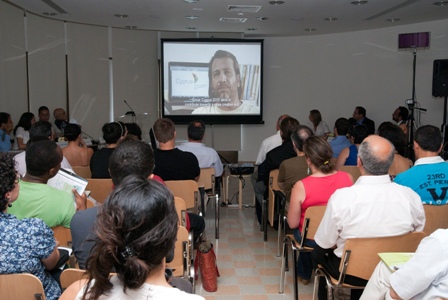'Cyprus 2015’ presents latest research on Cyprus sustainability report

The most recent report of the ‘Cyprus 2015’ initiative on Sustainable Development was presented to Cypriots from both sides of the island at a public launch event on 20th June 2011 in the Buffer Zone, Nicosia.
Sustainability provides opportunities for the peace process
This latest report addresses how achieving sustainability is a critical issue for the survival and wellbeing of both the Greek Cypriots and the Turkish Cypriot communities on the island. Solving the long standing political dispute between the two communities is seen as the central issue, on which everything else hinges. While working to achieve a political settlement is crucial, the challenge of sustainable development represents an opportunity for the two communities to work together on sustainable solutions for economic and social development.
Jointly addressing sustainability will build trust in the peace process
The challenges to sustainable development present a set of problems where more efficient and effective solutions can be achieved through inter-communal collaboration than through unilateral action. In the context of the peace process the confidence building potential of working together and achieving demonstrable progress in sustainability related issues becomes both a need but also an opportunity.
Coming together to develop solutions for sustainability challenges
The ‘Cyprus 2015’ report addresses four main areas, where communities could work together towards joint strategies and proposes possible solutions for sustainable development. These areas include solutions for the challenges related to energy, water, construction practices and mobility:
“We as Cypriots, need to demonstrate that beyond our known problem we also share a vision for Cyprus; a vision for the future based on joint action on matters of sustainable development, which would lead to a superior outcome than if each community takes action separately.” Alexandros Lordos, 'Cyprus 2015’ Research Co-Director.
Energy sustainability
Solar power provides a solution to the energy problem of both communities. Cyprus is extremely well situated to further research and develop solar energy systems. A potential project, that the two communities could implement jointly could be a solar power plant built along the Buffer Zone. Both communities would benefit equally from the solar energy supplied by the power plant.
Water sustainability
In order to face the water shortage, emphasis should be placed on farming practices, which currently consume more than 70% of water supplies. To address these issues a participatory dialogue process is called for, which should include farmers, water experts and other appropriate stakeholders from both communities. This dialogue and the constructive interaction in order to solve common problems of all inhabitants of the island would build trust among representatives of both communities.
Sustainable construction practices
Over-construction in both communities, coupled with unsustainable construction practices, has led to a sharp increase in energy bills. A first step to remedy the situation should be the commissioning of a sustainable construction planning guide, which would integrate international best practices with Cyprus’ architectural traditions. This planning guide is to be designed by experts from both communities thus including the views and traditions of Greek and Turkish Cypriots.
Sustainable mobility
Both communities in Cyprus are still firmly in the grip of the private car culture. This challenge offers significant opportunities for co-operation between the two communities. The most promising idea to face this challenge is the construction of a light rail system linking the various cities on the island. This project is currently being developed separately in both communities but could be further developed into a broader vision for an island-wide light rail network.
“A sustainable future is dependent on a social economic framework. The research here embraces social and ecological values”
Erol Kaymak, ‘Cyprus 2015’ Research Co-Director.
A Sustainable Development Master plan for Cyprus
The report further suggests the establishment of a committee that designs a Sustainable Development Master Plan along the four themes lined out in this report. The committee should work under the auspices of the leaders of both communities.
